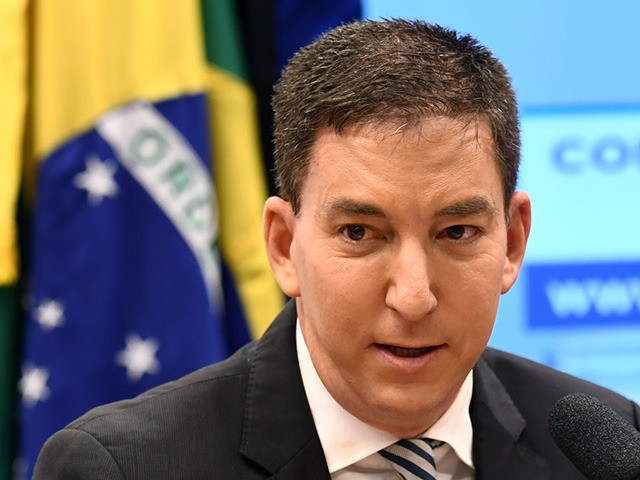Brazilian Judge Ricardo Leite dismissed charges against journalist Glenn Greenwald on Thursday citing a Supreme Court injunction against prosecuting Greenwald for engaging in journalism. Prosecutors charged Greenwald with cybercrimes over allegedly advising hackers to destroy incriminating evidence.
Greenwald has denied that he engaged in the alleged criminal activity, which prosecutors claim occurred during the process of Greenwald procuring private conversations among high-ranking Brazilian officials. Greenwald published conversations at The Intercept featuring remarks from current Minister of Justice Sergio Moro from when he was the judge responsible for the “Operation Car Wash” corruption investigation. The excerpts showed Moro’s growing distaste for former socialist President Luiz Inácio Lula da Silva as the probe went on. Moro’s investigation ultimately led to Lula being sentenced to over a decade in prison for using illegally procured kickback funding to buy a luxury beachfront property.
Prosecutors claimed that Greenwald, who claims that the Telegram messages he published were leaked to him and The Intercept, was aware that hackers had broken into Moro’s communications and advised them to destroy messages that would reveal their crimes. Charges against Greenwald were imposed alongside greater criminal charges for the individuals who committed the hacking, some of whom allegedly confessed to having done so.
Brazil’s Federal Supreme Court issued an injunction in response to the incident that banned prosecutors from charging Greenwald specifically for any activity involved in receiving, obtaining or transmitting information published in media outlets,” Brazil’s O Globo noted.
Judge Leite said in his decision that the injunction clearly barred prosecution against Greenwald in the hacking incident, but said that the evidence indicates that Greenwald indeed committed a crime.
“The journalist cannot suggest what the person committing illicit acts should do to escape the prosecution work of the State,” the judge wrote. “They can keep a secret and not reveal to public authorities the identity of their source, but without any instigating or reinforcement of an already existing idea on the part of the agent that makes investigative work difficult.”
Leite wrote that the evidence suggested that one of the hackers had doubts about deleting incriminating messages and Greenwald “expressed a favorable opinion” on the matter, urging him to destroy evidence. The judge called Greenwald’s conduct “moral participation” in crime and described it as a “clear attempt to obstruct the work of investigating illicit [activity] and it is not possible to use source secrecy protection to create an exception” to being prosecuted.
Leite concluded that Greenwald would not face charges “for now.”
In a statement relayed by The Intercept, Greenwald expressed mild relief while arguing that the judge did not go far enough, as any journalist without a personal supreme court injunction to his or her name would have faced charges.
“While I welcome the fact that this investigation will not move forward, this decision is insufficient to guarantee the rights of a free press,” Greenwald said. “The rejection is based on the fact that the Supreme Court already issued an injunction against attempts of official persecution against me. This is not enough. We seek a decisive rejection from the Supreme Court of this abusive prosecution on the grounds that it is a clear and grave assault on core press freedoms. Anything less would leave open the possibility of further erosion of the fundamental freedom of the press against other journalists.”
In remarks to Brazilian media, Greenwald similarly declared, “we are not satisfied.”
“The decision protects me individually, but it is a grave violation of the freedom of the press and can create a precedent for other journalists being criminalized in the future,” Greenwald told Brazilian journalist Leonardo Sakamoto. “We want a victory not only to protect me, but to protect the constitutional rights and liberties of the press. Because of that, we are going to the STF [Supreme Court].”
Greenwald also noted that the decision “more or less frees me from the danger of being criminally processed but, at the same time, puts at risk all the other journalists and freedom of the press.”
The editor-in-chief of The Intercept, Betsy Reed, offered supportive words for Greenwald but similarly warned that anyone also accused of helping criminals destroy evidence could face prosecution.
“Today’s ruling rightly rejects the charges against Glenn Greenwald. As federal police investigators affirmed last year, he did nothing wrong,” Reed said in a statement. “However, the ruling is narrow and procedural, based on the injunction issued by a Supreme Court minister last year.”
The original case against Greenwald, filed last month, claimed the journalist had “received material of illicit origin while the criminal organization [the hacker ring allegedly responsible] was still practicing such conduct, seeking new targets.” Prosecutors claimed that Greenwald “oriented the [hacker] group by telling them to dispose of messages archived to avoid linking the suspects to the ‘hacked’ content, demonstrating direct participation in criminal conduct.”

COMMENTS
Please let us know if you're having issues with commenting.